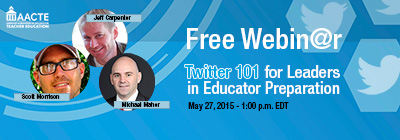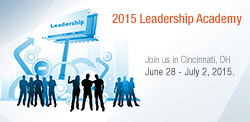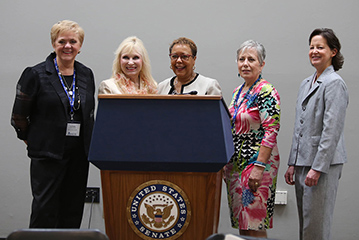09 Jun2015
By Jerrica Thurman
Today, AACTE’s Washington Week kicks off with a full lineup of interactive sessions, discussions, and advocacy around educator preparation. In addition to our traditional advocacy-focused events, we are hosting a special conference this afternoon on closing the student achievement gap in the critical subjects of science, technology, engineering, and mathematics (STEM).
Funded by a grant from the National Science Foundation, today’s conference will feature a multidisciplinary group of education researchers, practitioners, and scientists who will share their theoretical approaches and successful models for promoting the STEM achievement. The panelists will also discuss how to build collaborative, interdisciplinary partnerships for addressing the U.S. achievement gap in STEM subjects—drawing on international lessons—as well as ways to improve learning outcomes of underrepresented populations in the STEM fields.
02 Jun2015
By Tim Finklea

On May 26, the College of Education at William Paterson University (NJ) brought together university, school, and community members for a very special event organized by Candace Burns, dean of the college, and Sharon Leathers, director of educational innovations and grant initiatives. I was privileged to participate along with my colleague Rodrick Lucero, AACTE’s vice president for member engagement and support.
The event centered on the award-winning documentary American Promise, which follows two African American boys through 13 years of schooling in a unique coming-of-age film. Around the country, internationally, and through the PBS network, this amazing film has provoked new conversations and raised difficult questions about what the promise of education means in America, particularly for children of color.
02 Jun2015
By Scott Morrison, Jeff Carpenter and Michael Maher
Despite common caricatures of Twitter as the domain of callow teens and celebrity stalkers, it is a technology that should be taken seriously by teacher educators. Although social media has had a dramatic impact on communication in the modern world, the field of teacher preparation has been largely reluctant to add its voices to the mix. It is high time that we wake up to the role new media can play in our professional lives—and to the risks of remaining on the sidelines.
We have seen what can happen when we allow others to decide how our story is told, especially those who view our work with suspicion or even outright hostility. When U.S. Secretary of Education Arne Duncan said that “many if not most of the nation’s 1,450 schools, colleges, and departments of education are doing a mediocre job of preparing teachers for the realities of the 21st-century classroom,” for example, that message won broad circulation, including in social media. Today, the secretary’s and the U.S. Department of Education’s Twitter accounts reach more than 500,000 individuals. By comparison, AACTE’s Twitter account has approximately 5,600 followers.
29 May2015
By Michelle Kotek and Lucy Berrier
Earlier this month, we were excited and honored to attend the symposium “Closing the Gaps: A Policy and Practice Conversation to Advance an Opportunity Agenda,” presented by the National Education Association at the National Press Club in Washington, DC. It was a thought-provoking event, filled with great speakers and compelling strategies for closing gaps in student achievement and opportunity.
Panelists included Linda Darling-Hammond (Stanford University), Robert Balfanz (Johns Hopkins University), Kisha Davis-Caldwell (National Board for Professional Teaching Standards), Ron Ferguson (Harvard University), and many others. These speakers discussed gap-closing strategies, policy levers to support effective practices, and directions the education field will (and should) take in the future. They also consistently emphasized the importance of community engagement.
15 May2015
By Tim Finklea
The Council for the Accreditation of Educator Preparation (CAEP) seeks presentation proposals for its fall “CAEPCon” conference in partnership with AACTE, to be held September 17-19 at the Washington (DC) Hilton Hotel. Proposals must be submitted online by Sunday, May 24.
12 May2015
By Jeff Carpenter, Scott Morrison and Michael Maher

How can you use Twitter to market and promote your work? We’ll show you during a free webinar for AACTE members, “Twitter 101 for Leaders in Educator Preparation,” a spin-off from our interactive dialogue presented at AACTE’s 67th Annual Meeting in February.
On Wednesday, May 27, at 1:00 p.m. EDT, this webinar will provide a rationale for the use of Twitter, an overview of the platform, and best practices for use by you and your educator preparation program in this AACTE webinar. You’ll gain insight on how to leverage Twitter to tell your story to candidates, alumni, policy makers, and the public at large.
05 May2015
By Donna Sacco
At last month’s conference of the American Educational Research Association, I attended a joint business meeting of two special interest groups—Professional Development School Research and Supervision and Instructional Leadership—focused on the role of supervision of instruction in professional development schools (PDSs) from preservice to retirement. Panelists included AACTE’s Linda McKee, senior director of performance measurement and assessment policy; Daisy Arredondo-Rucinski, University of Alabama; and Bernard Badiali, Pennsylvania State University.
30 Apr2015
By Matthew Wales

Are you a new dean or department chair—or simply looking to advance your career as an academic administrator? Get ahead at AACTE’s Leadership Academy June 28–July 2, where you’ll learn the latest in leadership development.
Gain insights on how to effectively manage resources and programs, engage in dynamic discussions, and learn from top leaders in the field, while forging a supportive network of peers and mentors in an intimate setting at the Hilton Cincinnati.
28 Apr2015
By Jerrica Thurman

Participants in Day on the Hill join Sharon Robinson during Washington Week
Every year, AACTE’s Washington Week attracts hundreds from around the nation. Read these testimonials from recent participants about the value of attending:
20 Apr2015
By Matthew Wales
Last year, AACTE received 560 session proposals for its Annual Meeting in Atlanta. Given the limited number of spaces available for presentations, only 50% of proposals were accepted.
Looking to present at AACTE’s 2016 Annual Meeting in Las Vegas? Want to make your proposal stand out from other proposals received? Here are five tips to help your proposal rise to the top.
14 Apr2015
By Rodrick Lucero

Join your voice with those of other educator preparation providers at AACTE’s annual Washington Week, to be held in the nation’s capital June 9-11. Under the unifying theme “Diverse Perspectives, Deep Partnerships, One Profession,” this year’s Washington Week will be held at the Washington Marriott Wardman Park Hotel. This is your chance to deliberate with colleagues on provocative issues in the profession, experience interactive sessions with national leaders, and convene with policy officials.
07 Apr2015
By Jerrica Thurman
Kick off the summer with AACTE’s signature June events: Washington Week and the Leadership Academy. Join your colleagues from around the country in Washington, DC, advocating for the profession on Capitol Hill and participating in a special conference on closing the achievement gap in science, technology, engineering, and mathematics (STEM) fields; or meet with fellow new deans and administrators in Cincinnati, Ohio, for intensive leadership development and networking. These are two popular summer conferences, so mark your calendar today!
31 Mar2015
By Omar Davis and Whitney Watkins

AACTE Holmes Scholars connect during the Annual Meeting in Atlanta
More than 60 AACTE Holmes Scholars® participated in the Annual Meeting in Atlanta last month. The commitment of their 15 host institutions, as well as of AACTE, to building a more diverse professional community was on full display in the lively atmosphere and collegial environment at the conference, which offered a platform of reinvigoration for some and the start of an exciting journey for others. One attendee commented that she had not experienced that much energy in quite a while.
At the kick-off session February 27, AACTE’s Rodrick Lucero, vice president for member engagement and support, described the Association’s renewed commitment to the Holmes Scholars Program and emphasized its value and necessity in the field. He highlighted goals for the coming year, which touched on not only recruiting and retaining scholars in academia, but looking closely at the entire continuum of PK-24. Lucero praised the National Association of Holmes Scholars Alumni (NASHA) for its continued support in providing highly sought-after mentoring services for 1st-year and midlevel doctoral students.
31 Mar2015
By Zachary VanHouten
Attendees of the 67th AACTE Annual Meeting in Atlanta were offered an opportunity to meet with a U.S. Department of Education official to discuss the Teacher Quality Partnership (TQP) grants and how they may explore applying for them in the future.
In a concurrent session presentation, Mia Howerton of the U.S. Department of Education Office of Innovation and Improvement provided attendees with an overview of the TQP grants and what the profile of a successful grantee applicant typically looks like. With the TQP program now in its third grant cycle, Howerton reviewed the successes and challenges of the program and shared its lessons with audience members.
31 Mar2015
By Etta R. Hollins

Editor’s Note: Professor Hollins inspired attendees of AACTE’s recent Annual Meeting in Atlanta during the Speaker Spotlight Session. (View a video recording of her speech here, and read another version in this Hechinger Report piece, which includes the video she played during her address.) To follow up on her presentation, we invited Hollins to explore her topic in a series of blogs for Ed Prep Matters. This is the second post in the series.
Teaching is an interpretive practice that requires knowledge of the community where students grow and develop, and where they are socialized. Students’ initial and ongoing learning happens within a particular community; is framed by the ideologies and practices of the community; is influenced by the experiences, interests, and values shared among members of the community; and is appropriated through the learner’s perception, which is developed within the particular community. The initial learning that happens within a community constitutes the intellectual, psychological, social, and emotional development of the individual person.













